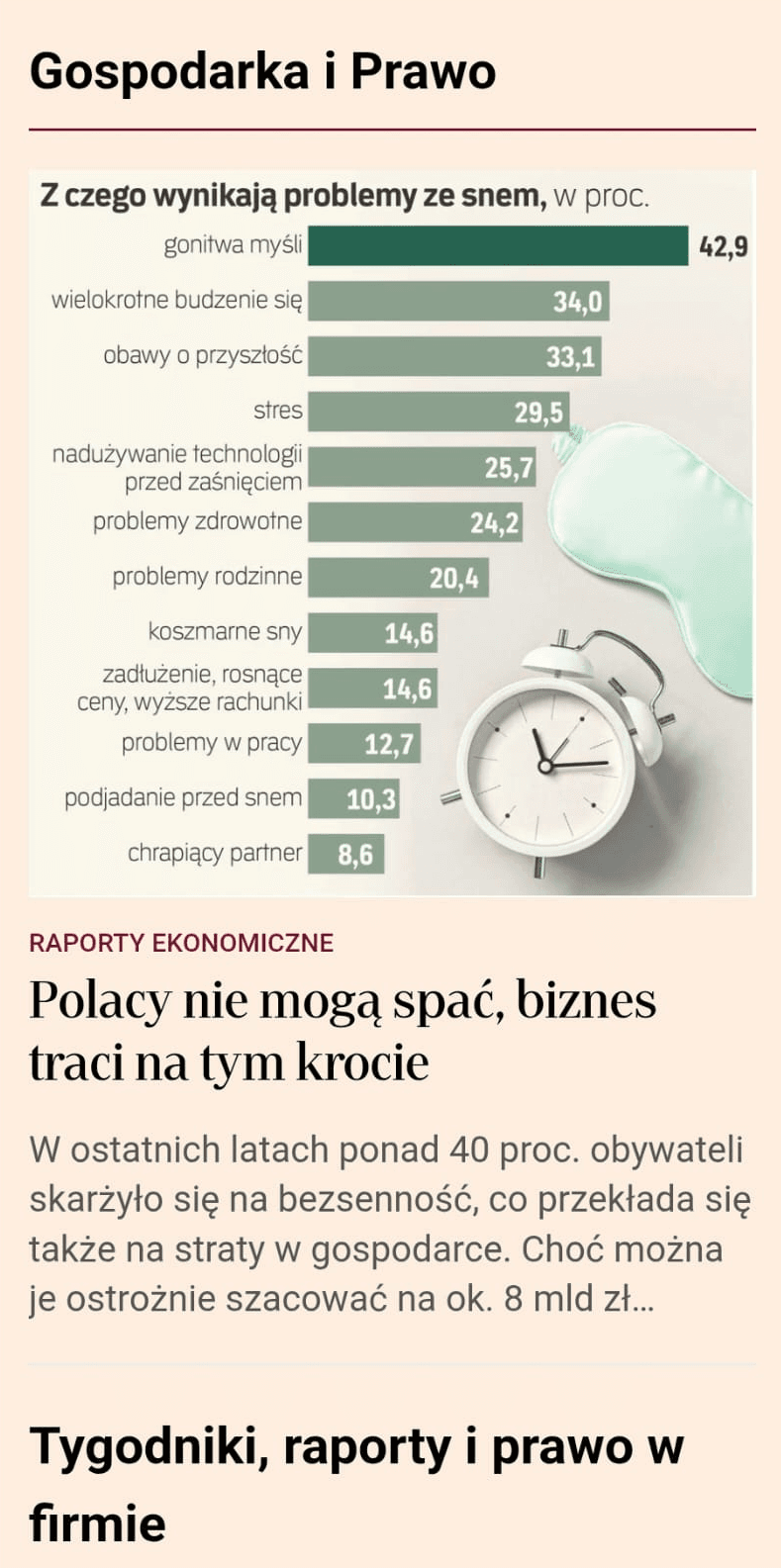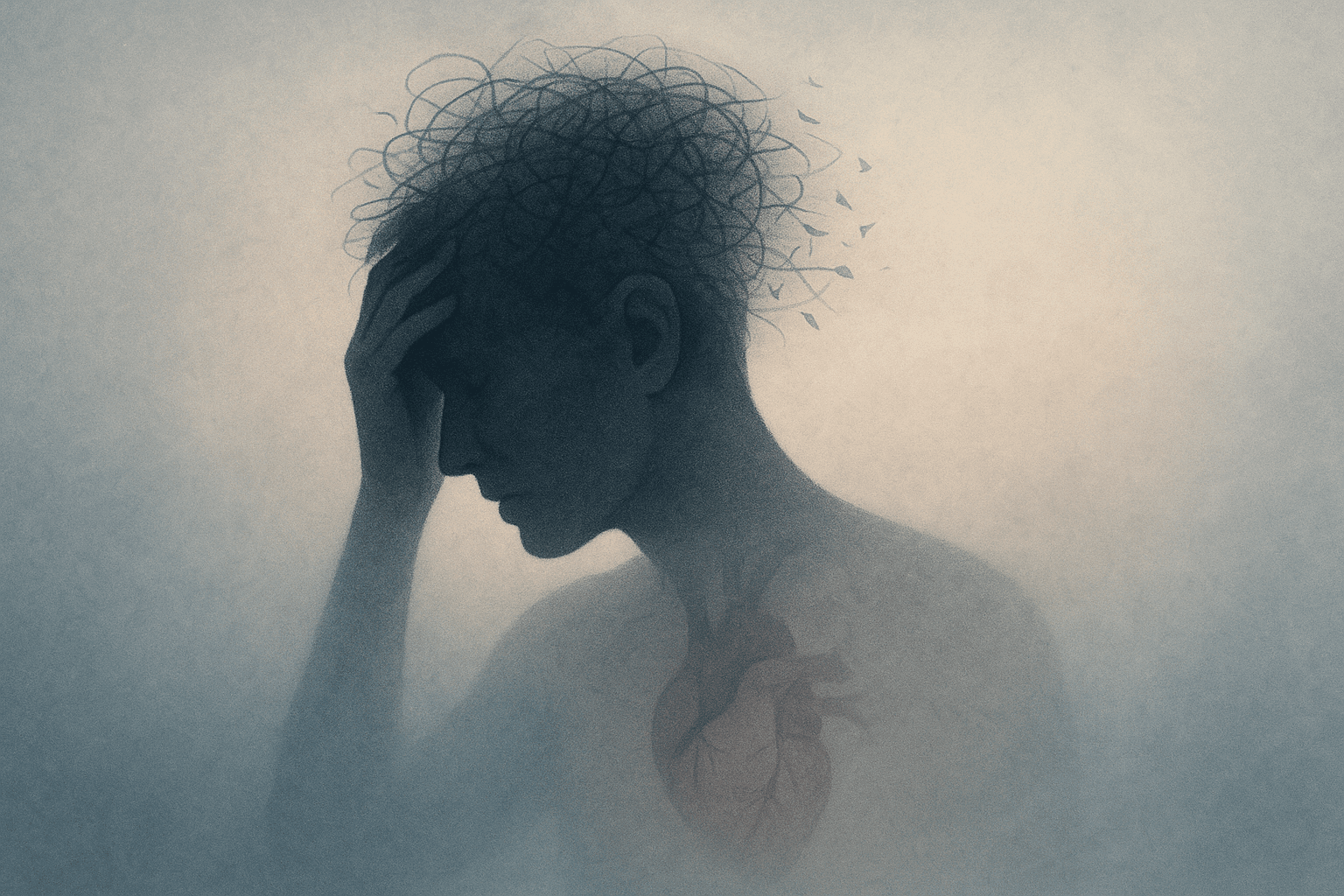
Health and Stress
Explore the profound impact of chronic stress on physical and mental health, backed by recent research showing increased risks of cardiovascular disease, sleep disruption, and various health symptoms affecting the majority of adults.
Health and Stress
People with work-related chronic stress have a 50% increased risk of cardiovascular disease. What's more, long-term stress is associated with diabetes and obesity, which significantly increase the risk of cardiovascular disease. (Journal of Clinical Medicine, 2022)
Seventy-six percent of adults reported that stress impacted their health, with symptoms that included headache, tiredness, nervousness, anxiety, and depression or sadness. (American Psychological Association, 2022)
Almost 90% of Americans reported losing sleep at night due to worries about health and the economy, and 20% of the population reported almost always losing sleep due to money worries. (American Academy of Sleep Medicine, 2022)
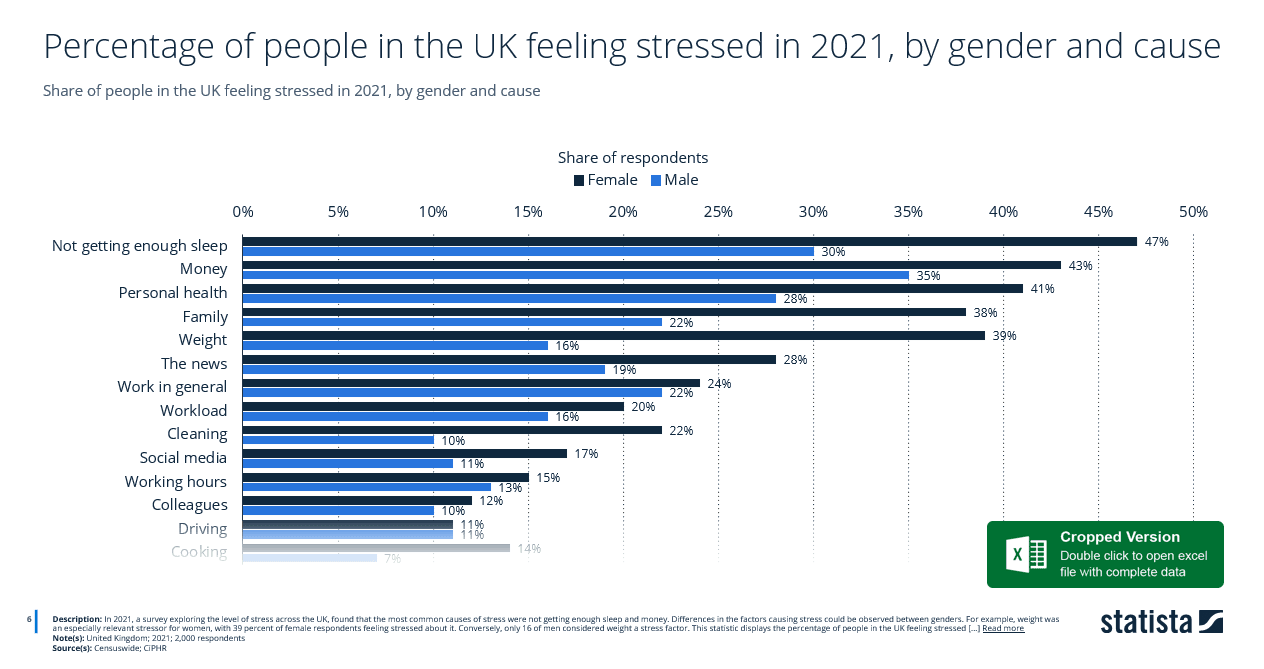
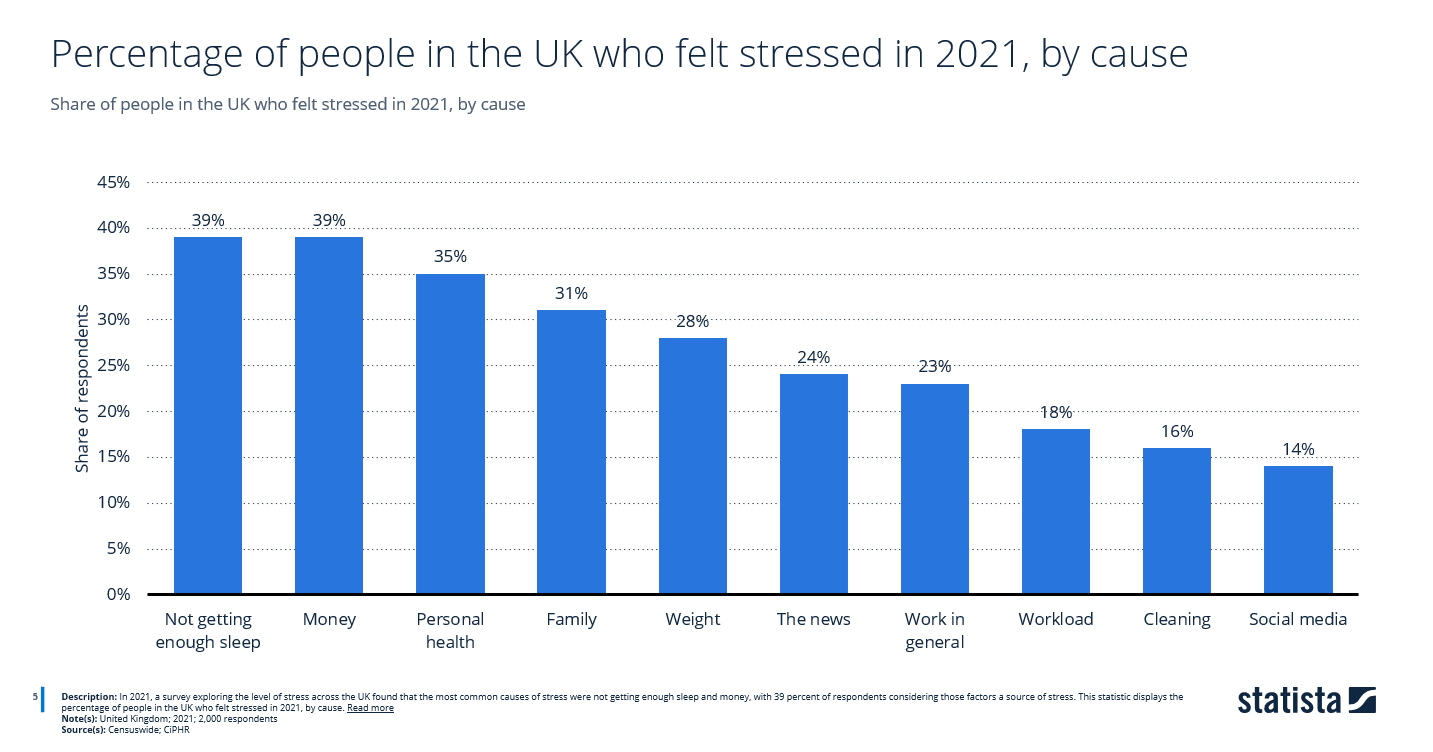
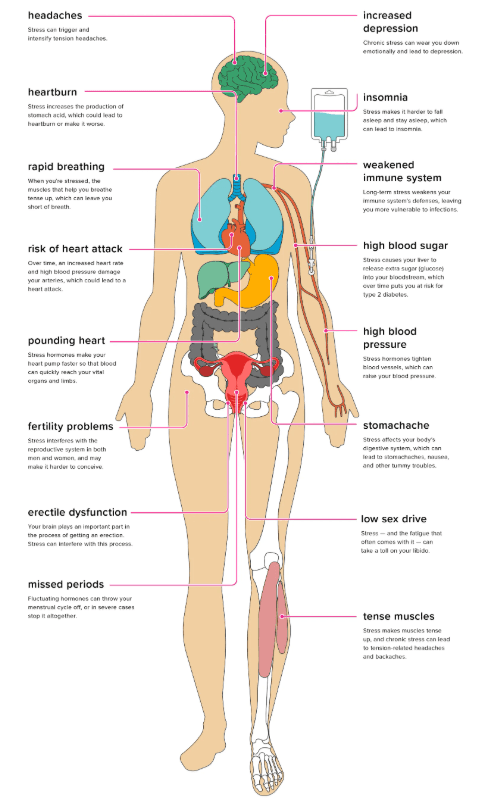
Historical Understanding of Stress
Stress hypothesis overload: 131 hypotheses exploring the role of stress in tradeoffs, transitions, and health Breanna N. Harris⁎,1 Department of Biological Sciences, Texas Tech University, Lubbock, TX, United States; General and Comparative Endocrinology 288 (2020) 113355; Breanna N. Harris, Department of Biological Sciences, Texas Tech University, Lubbock, TX, United States
It has been nearly 85 years since Hans Selye brought the term stress to the field of physiology (Selye, 1936; see Viner, 1999 for history). The concept of stress has been a major boon (Fink, 2016a) for physiology, medicine, ecology, and evolution as is evidenced by the multitude of studies linking stress to behavior, health, tradeoffs, survival, and fitness. Stress, broadly defined, can impact all life, ranging from unicellular organisms, to plants, to vertebrates, and thus the role of stress in shaping selection, evolution, and tradeoffs is likely. Selye defined stress as "a state manifested by a specific syndrome which consists of all the non-specifically induced changes in a biologic system" (Selye, 1959) and, later, the "the nonspecific response of the body to any demand made upon it" (Selye, 1973). He went on to highlight the ubiquity of stress by stating "stress is not simply nervous tension; stress reactions do occur in lower animals, which have no nervous system, and even in plants" (Selye, 1973).
Stress and Health
Annual Review of Clinical Psychology Volume 1, 2005; Stress and Health: Psychological, Behavioral, and Biological Determinants Neil Schneiderman, Gail Ironson, and Scott D. Siegel; Vol. 1:607-628 (Volume publication date April 2005) https://doi.org/10.1146/annurev.clinpsy.1.102803.144141
Chronic stress significantly impacts both physical and mental health. Prolonged stress can have significant health consequences, affecting both physical and mental well-being. Physically, chronic stress can lead to cardiovascular issues such as hypertension and heart disease, as well as gastrointestinal problems like irritable bowel syndrome. It can also weaken the immune system, making individuals more susceptible to infections and illnesses. Additionally, prolonged stress can contribute to metabolic disorders, including diabetes and obesity, due to hormonal imbalances and changes in appetite and eating behaviors.
Mentally, extended periods of stress can result in anxiety, depression, and other mood disorders. Cognitive functions may also be impaired, leading to difficulties with concentration, memory, and decision-making. Stress can disrupt sleep patterns, causing insomnia or poor-quality sleep, which further exacerbates mental health issues. Over time, the cumulative effects of chronic stress can significantly diminish overall quality of life and well-being.
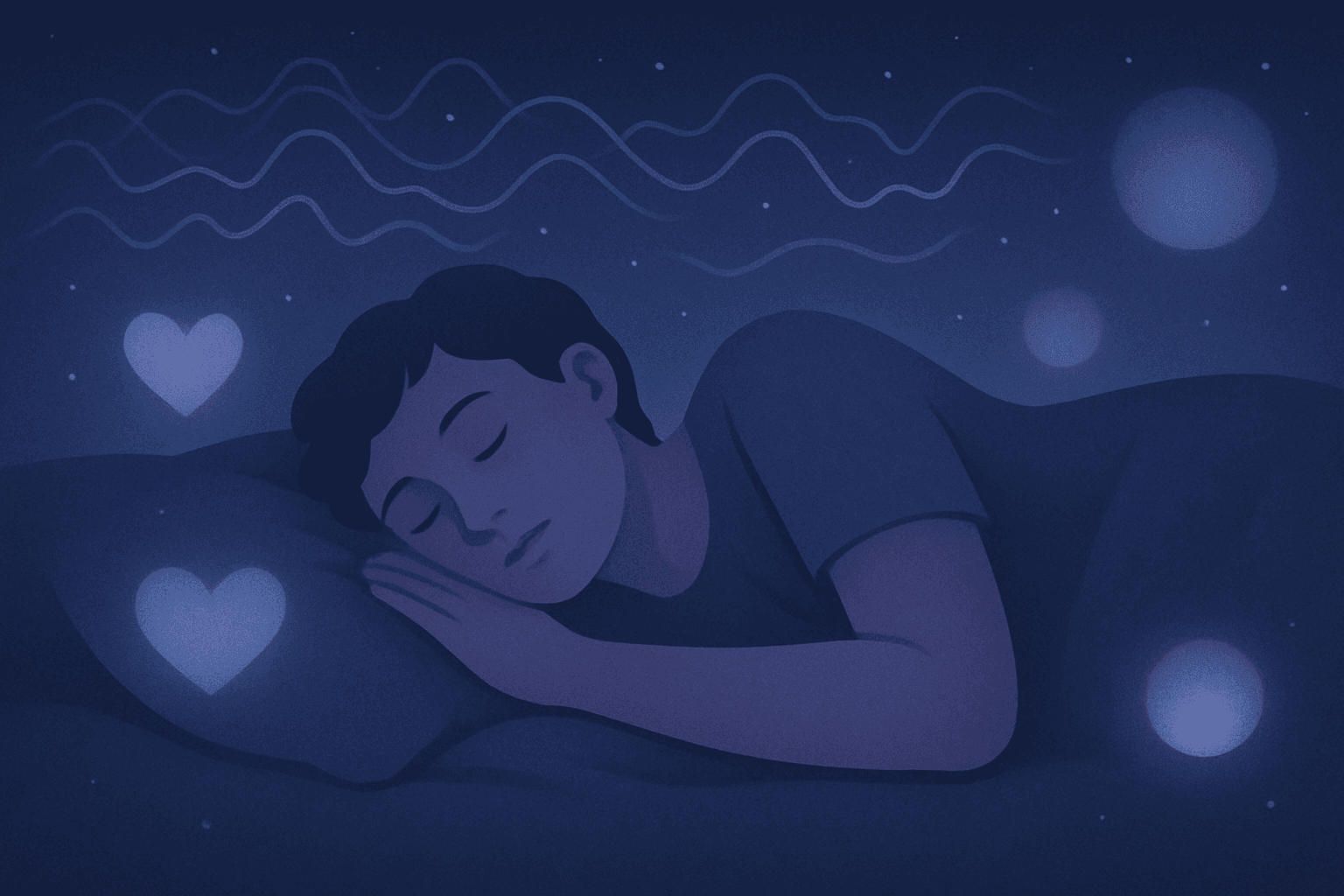
Sleep and Its Importance
Delve into the critical role of sleep in overall health, emphasizing its influence on cognitive function, emotional well-being, and physical health, while highlighting the detrimental effects of sleep deprivation.
Sleep and Its Importance
Sleep is essential for maintaining good health, facilitating physical recovery, cognitive function, and emotional regulation. Poor sleep quality can worsen stress and negatively affect overall health.
Impact on Life Aspects
Percentage of adults in the United States who stated sleep has a major impact on select aspects of their life as of 2022, by gender (Source: Statista)
- Release date March 2022
- Region United States
- Survey time period January 11 to 17, 2022
- Number of respondents 1,505 respondents
- Age group 18 years and older
- Method of interview Online survey
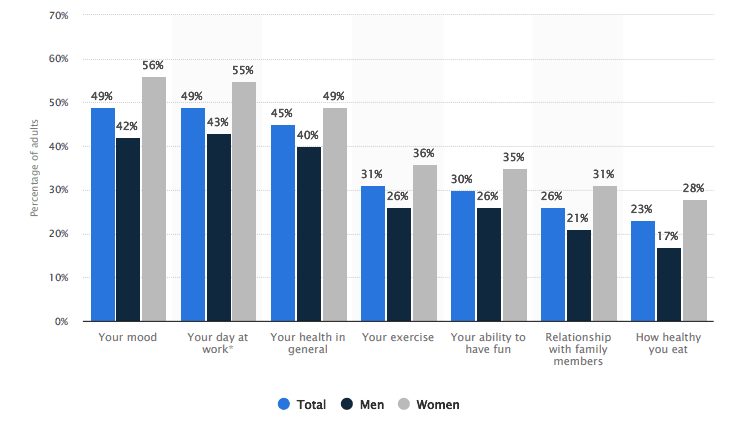
Sleep Improvement Actions
Percentage of U.S. adults who carried out select actions to improve their sleep as of 2023 (Source: Statista) Release date March 2024
- Release date March 2024
- Region United States
- Survey time period December 2023
- Number of respondents 3,035 respondents
- Age group 18 years and older
- Method of interview Online survey
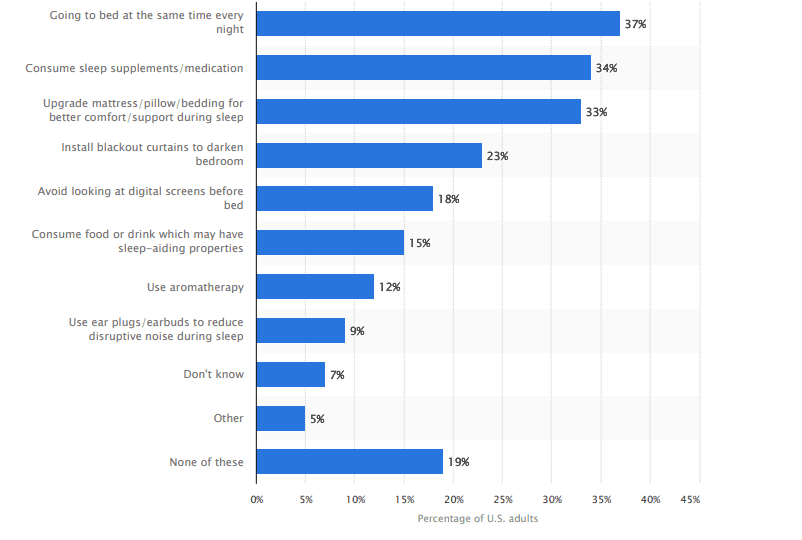
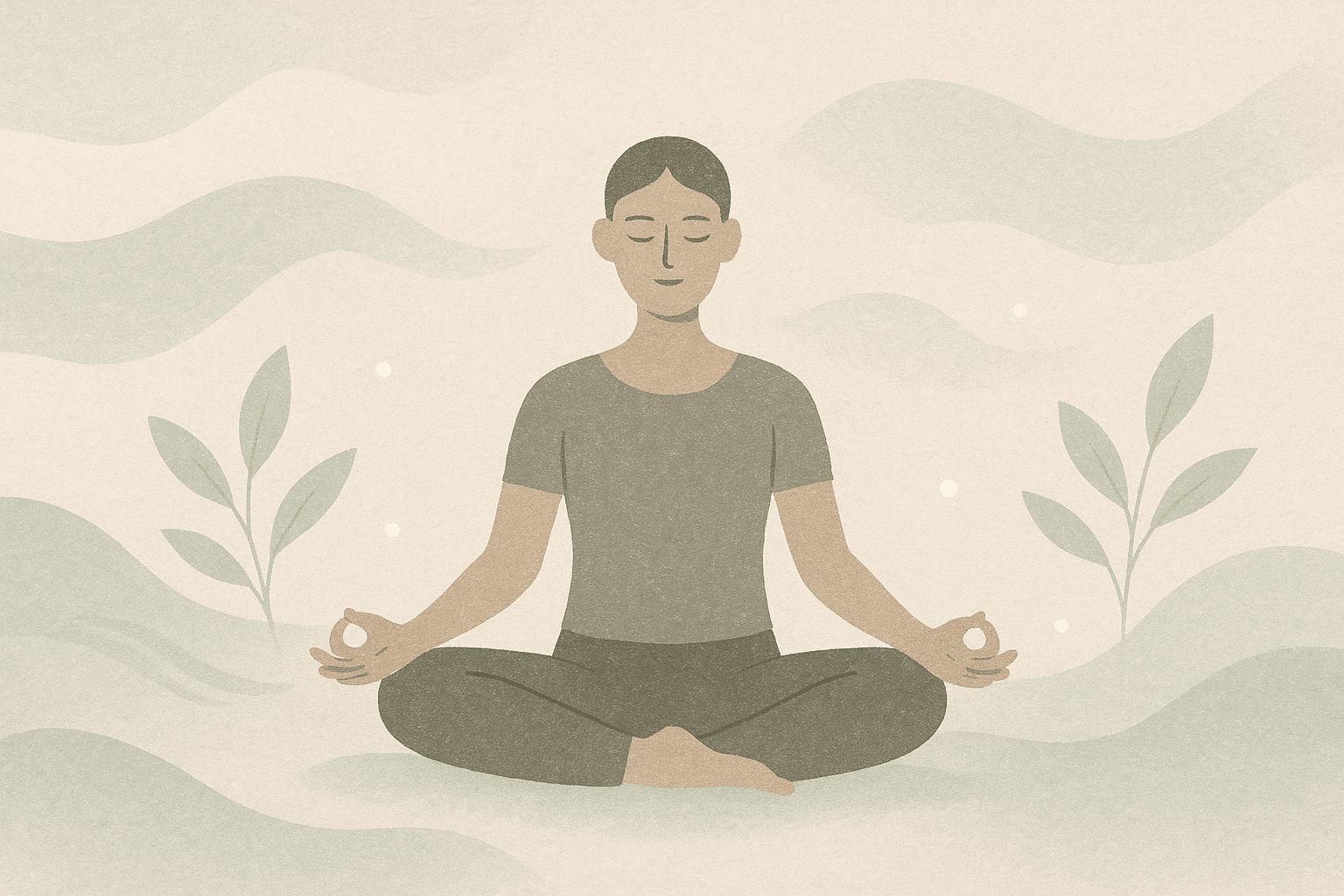
Mindfulness and Stress Reduction
Discover how mindfulness practices can mitigate stress and improve sleep quality, supported by meta-analysis research showing significant benefits compared to control treatments across various clinical populations.
Mindfulness and Stress Reduction
Mindfulness, as defined by Jon Kabat-Zinn, involves paying attention in a particular way: on purpose, in the present moment, and nonjudgmentally. This practice nurtures greater awareness and acceptance of present-moment reality, helping individuals manage stress by promoting relaxation and reducing sleep-interfering cognitive processes. The meta-analysis by Rusch et al. supports the long-term benefits of mindfulness meditation on sleep quality.
Wherever You Go, There You Are. Mindfulness Meditation in Everyday Life.
Jon Kabat-Zinn, 1994
Library of Congress Cataloging-in-Publicadon Data Kabat-Zinn, Jon. Wherever you go. there you are: mindfulness meditation in everyday life / Jon Kabat-Zinn. - 1st ed. p. em. ISBN 0-7868-8070-8
Hyperion. 114 Fifth Avenue, New York, New York 10011.
You can always use the very moment of waking up, no matter what time it comes, as a moment of mindfulness, the very first of the new day. Before you even move, try getting in touch with the fact that your breath is moving. Feel your body lying in bed. Straighten it out. Ask yourself, "Am I awake now? Do I know that the gift of a new day is being given to me? Will I be awake for it? What will happen today? Right now, I don't really know. Even as I think about what I have to do, can I be open to this not-knowing? Can I see today as an adventure? Can I see right now as filled with possibilities? Pages 182-183
Mindfulness means paying attention in a particular way: on purpose, in the present moment, and nonjudgmentally. This kind of attention nurtures greater awareness, clarity, and acceptance of present-moment reality. It wakes us up to the fact that our lives unfold only in moments. If we are not fully present for many of those moments, we may not only miss what is most valuable in our lives but also fail to realize the richness and the depth of our possibilities for growth and transformation. Page 4
The effect of mindfulness meditation on sleep quality
ANNALS OF THE NEW YORK ACADEMY OF SCIENCES Special Issue: Annals Reports REVIEW The effect of mindfulness meditation on sleep quality: a systematic review and meta-analysis of randomized controlled trials Heather L. Rusch, 1,2 Michael Rosario,2 Lisa M. Levison,3 Anlys Olivera,2 Whitney S. Livingston,2 Tianxia Wu,4 and Jessica M. Gill Ann. N.Y. Acad. Sci. 1445 (2019) 5–16 Published 2018
Discussion (page 12-13)
The evidence suggests that mindfulness meditation can improve sleep quality in a variety of clinical populations with sleep disturbance. While our results indicated no effect of mindfulness meditation on sleep quality when compared with evidenced-based sleep treatments, the strength of evidence was low and further studies are needed to elucidate these findings. Results also indicated that mindfulness meditation significantly improved sleep quality compared with nonspecific active controls. This meta-analysis only included RCTs with an active comparator group, so there is greater confidence that the reported benefits are not attributed to placebo effects commonly observed in usual care and waitlist control trials. At a 5- to 12-month follow-up, mindfulness meditation did not differ in effect from evidencebased sleep treatments and significantly improved sleep quality compared with nonspecific active controls. These findings provide preliminary evidence for a long-term effect. The maintenance of intervention effects may be attributed to learned techniques that reduce sleep-interfering cognitive processes, changes in sleep architecture, as well as morphometric and connectivity alterations in sleep-related brain regions. Despite these advances, additional evidence is needed to clarify the conditions and mechanisms that drive the maintenance of intervention effects. The evidence did not support a dose–response relationship between in-class meditation hours and sleep quality scores. This finding is consistent with a meta-analysis of 20 trials that assessed the relationship between in-class meditation hours and psychological distress. The link between at-home practice minutes and sleep quality scores was inconclusive because of the limited number of trials that assessed this relationship. Dose–response relationships are arguably one of the most challenging measures in meditation research. It is difficult to accurately assess how mindful (versus mind wandering) an individual is during meditation practice. Studies with tailored curriculums, expert instructors, and different patient populations may result in larger effects with shorter course durations. Moreover, the nonlinear trajectory of mediation progress is often misunderstood. Traditionally, success is defined by increased awareness and equanimity, whereby positive states are a byproduct. When symptom change over a short period is utilized as a benchmark of success, meditation progress and its potential effect on well-being may be veiled. Of the 10 trials that reported on adverse events, there was no evidence of increased risk of harm. Two trials reported a worsening of sleep quality in 3% and 7% of the meditation groups, compared with 24% and 12% in the comparator groups. Another trial reported one case of muscle soreness in the meditation group and one case of sleep disruption in the control group. It is not uncommon for symptoms to worsen, particularly in the early weeks of the intervention. Feelings of anger, sadness, or fear may appear stronger as practice develops since present moment awareness can highlight emotions. A history of trauma, mental instability, addiction, or major life changes may heighten emotional reactivity and require additional clinical monitoring.

Waking Up Experience
Techniques and tools for improving the transition from sleep to wakefulness, featuring research on artificial dawn, essential oils, nature sounds, and the science of morning cortisol response.
Waking Up Experience
The waking-up experience is crucial in setting the tone for the day. Research by Maan van de Werken et al. shows that artificial dawn can significantly reduce sleep inertia and improve the waking-up experience. Additionally, the use of bergamot essential oil has been found to alleviate psychological stress and improve sleep quality and morning wakefulness. These findings emphasize the importance of creating a positive waking-up environment to enhance overall well-being.
Cortisol effects
Cortisol Awakening Response, Internalizing Symptoms, and Life Satisfaction in Emerging Adults; International Journal of Molecular Scienses; 2017 Nov 27;18(12):2501. doi: 10.3390/ijms18122501; Li Shen Chong, Michelle Thai, Kathryn R Cullen, Kelvin O Lim, Bonnie Klimes-Dougan
In the area of stress neurobiology research, recent attention has focused on the cortisol awakening response (CAR). CAR involves the natural response of the HPA axis to awakening. Typically, a healthy individual experiences a sharp increase in cortisol secretion in the morning after waking, and then cortisol levels decline throughout the day. Specifically, there is an increase in cortisol levels within first 15 to 45 min following awakening [5]. The function of the CAR is yet unknown, but it is likely a part of the awakening process that is associated with rapid reciprocal switching between subcortical and cortical brain regions [6] as well as the physiological reactivity changes observed in response to stress [7]. This pattern of CAR is evident from childhood through adulthood, but with subtle changes noted across development [5].
Individual differences in HPA axis functioning might provide risk markers for emotional disorders [8,9]. Elevation of the CAR is associated with major depression [10,11] and possibly with anxiety disorders [12,13]. One of the largest CAR studies conducted to date by Vreeburg and colleagues [14] showed that adults (mean age: 44 years) with a diagnosis of a depressive or an anxiety disorder had an elevated CAR. Additionally, there is evidence that HPA axis dysregulation, including elevated CAR, might represent not only a biomarker for psychological disorders, but also a trait vulnerability to certain psychological disorders [11,14]. However, the findings have been more mixed when considering a dimensional approach to characterizing risk. For example, studies have found high neuroticism or harm avoidance to be positively [15,16], negatively [17], or not [11] associated with CAR. Research shows that psychosocial factors may be related to the discrepancy in CAR's directionality. Measures of job stress and general life stress were positively correlated with CAR, whereas fatigue, burnout, and exhaustion were negatively correlated with CAR [18]. Some of the mixed findings when considering dimensions of risk may be due to the fact that most studies with adults address a wide age group and do not typically account for development (for some exceptions refer to [19,20]).
While risk has been systematically assessed with regard to CAR, protective processes have rarely been studied. Evidence suggests that protective factors such as positive affect and optimism are associated with low cortisol levels [21]. Since life satisfaction, the general affective evaluation of a person's life [22], has been shown to be a reliable predictor of good health outcomes [23], it may serve as a protective factor. However, there has been less of an emphasis of how life satisfaction may influence physiological processes. We are only aware of one study to date that attempted to assess the links between life satisfaction and CAR [24]. They found a trend showing that low life satisfaction was associated with lower CAR among adults between the ages 35 and 84 years [24].
Artificial dawn
Journal of Sleep Research. Effects of artificial dawn on sleep inertia, skin temperature, and the awakening cortisol response
MAAN VAN DE WERKEN, MARINA C. GIMÉNEZ, BONNIE DE VRIES, DOMIEN G. M. BEERSMA, EUS J. W. VAN SOMEREN, MARIJKE C. M. GORDIJN
First published: 02 August 2010 https://doi.org/10.1111/j.1365-2869.2010.00828
Maan van de Werken, Department of Chronobiology, University of Groningen, P.O. Box 14, 9750 AA Haren, The Netherlands. Tel.: +31-0-50-3632026; fax: +31-0-50-3632148; e-mail: m.van.de.werken@rug.nl
Summary
The effect of artificial dawn during the last 30 min of sleep on subsequent dissipation of sleep inertia was investigated, including possible involvement of cortisol and thermoregulatory processes. Sixteen healthy subjects who reported difficulty with waking up participated in random order in a control and an artificial dawn night. Sleep inertia severity was measured by subjective ratings of sleepiness and activation, and by performance on an addition and a reaction time task measured at 1, 15, 30, 45, 60, and 90 min after waking up at habitual wake up time at workdays. At all intervals, saliva samples were collected for cortisol analysis. Sleep electroencephalogram was recorded during the 30 min prior to waking up; core body temperature and skin temperatures were recorded continuously until 90 min after waking up. Subjective sleepiness was significantly decreased and subjective activation increased after waking up in the artificial dawn condition as compared with control, in which lights were turned on at waking up. These effects can be explained by effects of artificial dawn on skin temperature and amount of wakefulness during the 30 min prior to the alarm. Artificial dawn accelerated the decline in skin temperature and in the distal-to-proximal skin temperature gradient after getting up. No significant effects of artificial dawn on performance, core body temperature, and cortisol were found. These results suggest that the physiology underlying the positive effects of artificial dawn on the dissipation of sleep inertia involves light sleep and an accelerated skin temperature decline after awakening.
Aromatherapy- bergamot essential oil
Complementary Therapies in Medicine 77 (2023) 102976, Available online 23 August 2023. Relieving psychological stress and improving sleep quality by bergamot essential oil use before bedtime and upon awakening: A randomized crossover trial. Nobuyuki Wakui, Chikako Togawa, Kotoha Ichikawa, Raini Matsuoka, Mai Watanabe, Aika Okami, Shunsuke Shirozu, Miho Yamamura, Yoshiaki Machida. Division of Applied Pharmaceutical Education and Research, Faculty of Pharmaceutical Sciences, Hoshi University, 2-4-41 Ebara, Shinagawa-ku, Tokyo 142-8501, Japan
Discussion (page 4-5)
In this study, 48 university students were randomly allocated into two groups, and a randomized controlled trial was conducted to determine whether bergamot essential oil could reduce psychological stress and improve sleep quality. The results showed that using bergamot essential oil significantly improved "sleepiness on rising," "refreshing on rising," and "sleep length," which are the OSA-MA subscales. Bergamot essential oil use for 1 week was also useful in alleviating depression and stress conditions. Additionally, it was noted that the scent of bergamot increased the sense of happiness. On the other hand, participants who were not accustomed to using the aroma oil may have experienced a fresh and relaxed sensation, potentially contributing to improved sleep quality. Despite the possibility of some participants becoming less sensitive to the intervention's effects, we did not observe a significant decline or clear signs of desensitization during the one-week intervention period.
Regarding the OSA-MA rating scale, the group using bergamot essential oil showed improvement in sleepiness on rising, refreshing on rising, and sleep length. Notably, from the value of effect size, the strongest effect of bergamot essential oil was on refreshing on rising. The question items about refreshing on rising included fatigue, body malaise, and mood. Aroma oil has been reported to be effective in the recovery of fatigue, which is consistent with the results of our study. Sleepiness on rising was also improved in Time 2 and Time 3. The question items about sleepiness upon awakening included concentration, stress, wakefulness, and willingness to answer. Bergamot essential oil has been reported to be effective in alleviating depressive mood and using bergamot essential oil upon awakening has been reported to alleviate stress and improve wakefulness. These results are consistent with those of our study, which showed that bergamot essential oil improved sleepiness upon awakening. Sleep length was significantly improved in Time 3. Question items about sleep length included appetite and length of sleep time. Smelling the scent of bergamot may help balance the nerves, which leads to the resolution of stress-induced anorexia and improvement of sleep status. Bergamot enhances the quality of sleep onset due to its relaxation effects, potentially benefiting individuals with symptoms of depression and insomnia caused by stress. Based on the findings of this study, bergamot can be considered effective in enhancing the ease of falling asleep, indicating its potential to improve sleep-onset quality. Regarding the DASS-21 rating scale, significant differences were observed in depression and stress. Depression is often triggered by stress. The number of patients with depression has increased by 1.8 times since 2002.31 Therefore, improving the depressive state and stress resolution are important to prevent the onset of depression, which is increasing in Japan. Previous studies using inhalation methods showed that aromatherapy is effective in alleviating depression and stress. This study suggests that bergamot essential oil improves daily mood in healthy students at bedtime and waking-up time, even those who underwent an annual health check-up at the school and were confirmed to be healthy students. The fragrance of bergamot has been reported to promote positive emotions.34 In this study, an increase in subjective well-being was observed on the SHS. However, it has been thought that although it is effective in increasing the sense of well-being in relatively healthy people, it is not effective enough in people with a high degree of stress. In this regard, since this study included participants who did not suffer from sleep disturbance and did not have a relatively high degree of stress, the effect on the sense of well-being seemed to be strong.
Conclusion (page 6)
Bergamot essential oil improved sleepiness on rising, refreshing on rising, sleep length, and depressed mood when used before bedtime and upon awakening compared with placebo. The study results suggest that the scent of bergamot essential oil is effective in alleviating psychological stress, and its use is a safe and inexpensive way to improve sleep quality and morning wakefulness.
Penumbral thoughts
Fedrigo V, Galizzi MM, Jenkins R, Sanders JG (2023) Penumbral thoughts: Contents of consciousness upon waking. PLoS ONE 18(12): e0289654. https://doi.org/10.1371/journal.pone.0289654 Received: January 13, 2023. Accepted: July 21, 2023. Published: December 14, 2023.
Discussion (page 9-11)
In this paper we sought to understand penumbral thoughts—the contents of consciousness at the boundary between sleep and wakefulness. The combination of qualitative and quantitative data reveals a cohesive picture of thought content across age groups, genders, and weekdays. The homogeneity of responses across a broad participant sample suggests that certain cognitive priorities may be characteristic of regaining consciousness. First, we observe a much higher incidence of questions in reports of penumbral thoughts (27%) than expected based on language use elsewhere (5%). The apparent overrepresentation of questions suggests an orientation towards information seeking. Second, we identify the principal themes of penumbral thoughts—a mental or physical check-in, locating oneself in time, and previewing tasks for the day ahead. Third, we find that temporal location is less well known than spatial location upon waking, and that resolving time and day is a priority. How do penumbral thoughts compare to other wakeful thoughts? There are some points of contact and some points of departure. Compared with previous studies, we see broadly similar patterns for affective valence, self-orientation, and temporal direction (past vs. future). On the other hand, penumbral thoughts seem to be especially focused on the short-term future, particularly the day ahead. Whereas D'Argembeau, Renaud & van der Linden found that only about 1 in 3 future-oriented thoughts pertain to the same day, we find that nearly all penumbral thoughts concern this timeframe. We also find that time is often the subject of penumbral thoughts, with 1 in 5 participants trying to establish the time as they wake up.
Indeed, the dominance of a small number of themes among penumbral thoughts—internal state, orientation in time, tasks for the day ahead—suggest that the first moments of wakefulness may be especially convergent. Dreams are highly diverse across individuals. Wakeful thoughts are highly diverse across individuals. In comparison, penumbral thoughts appear to be much more restricted. As well as illuminating the nature of penumbral thoughts, our findings contribute to a growing psychological literature on the influence of the weekly cycle. It is well established that mood changes through the weekly cycle, both at the level of mental representations and at the level of reported experience. What is less clear is how these two levels may be related. Early retrieval of the day of the week suggests a path by which stereotypical weekday associations could set the tone for the rest of the day. At the same time, the uniformity of retrieval over the cycle suggests that differential associations for each day will land with similar force.
Nature sounds
Urban Forestry & Urban Greening 86 (2023) 127987. Available online 7 June 2023. Effects of nature sounds on the attention and physiological and psychological relaxation. Injoon Song, Kwangsik Baek, Choyun Kim, Chorong Song, Dept. of Forest Science, Kongju National University, Yesan, South Korea
Conclusions (page 7)
The findings of the present work show that resting with nature sounds after an attention task is more effective on physiologically and psychologically relaxation than urban sounds. In conclusion, hearing nature sounds may be an effective way to relieve stress in everyday life. (to be continued …)
source: https://pmc.ncbi.nlm.nih.gov/articles/PMC5751104/#B22-ijms-18-02501

Poles Can't Sleep, Costing Poland Billions of Zlotys
A look at the insomnia crisis in Poland affecting over 41% of the population and its significant economic impact, estimated at 8 billion PLN annually in productivity losses.
Poles Can't Sleep, Costing Poland Billions of Zlotys
Insomnia can certainly be added to the list of civilization problems. According to a UCE Research study, it affects 41.4% of Poles. And lack of sleep has a very negative impact on the economy.
Friday's edition of "Rzeczpospolita" describes the economic problem of insomnia – it refers to a study by UCE Research and the psychotherapy platform ePsycholodzy.pl. The study says that practically every second Pole complains of sleep problems. Similar results have persisted for years and seriously burden the country.
We're Losing 8 Billion PLN Due to Insomnia
Losses from insomnia aren't just a matter of time we could be working. Being poorly slept, in a terrible mood, and consequently tired impacts employees and, by extension, businesses. There are even outbursts of aggression caused by psychological strain.
This is all because by tossing and turning, waking up, and being tense, we lose the restorative function of sleep, as psychologist Michał Murgrabia emphasized in the "Rzeczpospolita" article.
According to the newspaper, researchers estimated the costs to the economy at about 8 billion zlotys annually. And that's without calculating the costs of replacing employees, recruitment processes, or customers dissatisfied with service.
The Problem of Civilization Diseases
What keeps us from sleeping well? You can probably name several examples from life off the top of your head: stress, constantly thinking about work, or worries about the future.
Phone overuse is also significant. Psychologists are once again reminding us that scrolling before sleep is not healthy. Additionally, social media doesn't affect us positively either, multiplying the above problems.
Phone addiction negatively impacts our work even when we should be working. Tired or not, we sometimes spend too much time on them.
"Excessive use of social media is a growing civilization problem that will deepen with increasingly widespread access to smartphones and remote work," says Dr. Kinga Stopczyńska from the marketing department of the Faculty of Management at the University of Łódź, quoted by "Rzeczpospolita."
Dr. Katarzyna Kalata, regarding the controversial case of an employee punished for taking a nap at work, reminded us that during our entitled break, we have the right to "catch a wink," which is healthier than browsing the internet on our phones.
Sleepless Behind the Wheel
Insomnia increases our mortality rate by several dozen percent, including increasing the risk of heart attack or stroke. Let's also add that many of us commute to work by car, sitting exhausted behind the wheel. This poses a serious threat not only to the sleep-deprived person. It's a particular problem for those who make their living by driving.
